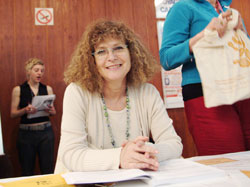Wide world of anthropology embraces human nature

Sociology Department Chair Christine Jourdan took time out from her duties as conference organizer to pose at the busy reception area. No sooner had this event ended than she was off to the ACFAS conference across town.
Photo by kate hutchinson
Human nature was the subject of a conference in the Hall Building May 9 to 14.
Does being human transcend particular cultures? It’s the question of the moment for anthropologists, according to Concordia’s Christine Jourdan, one of the chief organizers of the conference.
“We had avoided dealing with it. For a long time, the notion of culture predominated,” she said. “Now we’re looking at it again — group and identity, human nature in the human environment — and we’re trying to approach it philosophically as well as theoretically.”
Human Nature/Human Identity: Anthropological Revision-ings is the title given this year’s conference of CASCA, the Société Canadienne d’Anthropologie / Canadian Anthropology Society,
The keynote speaker was Michael Jackson, from Harvard, who delivered “A Walk on the Wild Side: The Idea of Nature Revisited.”
A phenomenologist, Jackson went back to the 19th-century romanticism of Jean-Jacques Rousseau to remind his listeners that the idea of nature “should be appreciated as a rhetorical stratagem for bolstering personal or communal confidence, consolidating authority, strengthening an argument, legitimating a claim for recognition or recompense.”
Five hundred and fifty scholars chewed over subjects ranging from indigenous people to scented fabrics, from automobile culture to gender reassignment.
Jourdan had a number of students presenting papers at the conference, and with two collaborators, presented a paper titled “Let Me See Your Recipes, I’ll Tell You Who You Are: Social Change Through Cookbooks in Quebec.”
She came to anthropology through linguistics. Like many ethnolinguists, she did field work in the South Pacific, and she subsequently published a dictionary of Pijin based on her work in the Solomon Islands. She and her husband, Kevin Tuite, an anthropologist at the Université de Montréal, have just published a book together: Language, Culture and Society (Cambridge University Press).
At Concordia, anthropologists share a department with sociologists. It’s a happy marriage, Jourdan said. Some of her colleagues have closer academic relationships with sociologists than with their fellow anthropologists because of their research.
“We are both represented on hiring committees to make sure there will be as much as dialogue as possible,” she said. The only thing the sociologists do that doesn’t directly interest the anthropologists is statistics — “but we’re glad they do it.”
There are about 80 masters students in the Department of Sociology and Anthropology. A proposal for a PhD is in the works.
Jourdan wasn’t expecting the conference to answer the question of whether human nature transcends culture. There are no easy answers — “it’s a series of grey zones.” That’s what makes the subject so absorbing, she said with a smile.
After the conference, Jourdan and some of her colleagues – Daniel Dagenais, Chantal Collard, Danielle Gauvreau among them —went to the ACFAS (Association francophone pour le savoir) conference.
She and Jean-Philippe Warren were part of a plenary panel on language politics, and the way the balance of power between languages shifts in colonial and postcolonial societies. Warren holds the junior chair in the study of Quebec at Concordia, and is on the executive of ACSALF, the association of francophone sociologists and anthropologists.
ACFAS took place at McGill this year, but with some unusual Concordia content: the shuttle buses. The conference organizers, determined to be as sustainable as possible, requested Concordia’s biodiesel buses to transport conference delegates to and from its Macdonald College campus on the western tip of the Island of Montreal.
